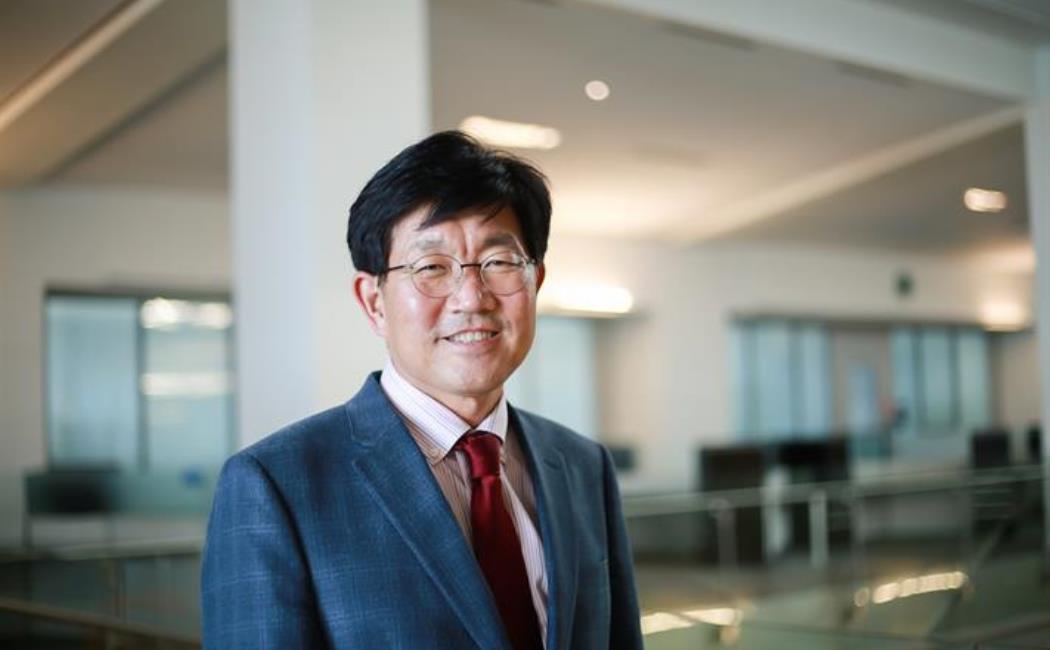


03 April, 2019
KAUST Professor of Mechanical Engineering Hong Im was recently elected as a Combustion Institute Fellow for his outstanding contributions to the fundamental understanding of combustion. Photo by Raheena Abdurehim
-By David Murphy, KAUST News
KAUST Professor of Mechanical Engineering Hong Im was recently elected as a Combustion Institute Fellow for his outstanding contributions to the fundamental understanding of combustion through the amalgamation of theory, numerical methods and high performance computational simulations.
Each year, members of the Combustion Institute, a nonprofit, international scientific and engineering society based in Pittsburgh, Pennsylvania, U.S., are recognized for fellowship selection by their peers, whether in the field of research or in applications.
"The Combustion Institute is one of the major scientific communities that I have been involved [with] from my student years. It is gratifying to be recognized by the institution that nurtured my entire professional career," Im stated.
"My Ph.D. work was mostly theoretical, and I started more serious computational studies during my postdoctoral tenure," he continued. "I believe that the fundamental background I gained through my student period allowed me to distinguish myself in utilizing the simulation data to provide physical insights on various laminar and turbulent flame phenomena."
Prior to joining KAUST in 2013, Im obtained his B.S. and M.S. in mechanical engineering from Seoul National University, South Korea, before completing his Ph.D. in mechanical and aerospace engineering at Princeton University, U.S. He is currently based in the KAUST Clean Combustion Research Center (CCRC) and is the principal investigator of the Computational Reacting Flow Laboratory (CRFL).
With an application focus on laboratory flames and combustion engines, Im and his CRFL research group employ various high fidelity simulation capabilities to predict the fundamental physics of laminar and turbulent combustion phenomena. He noted that his fellowship to the Combustion Institute can be in equal parts credited to the highly communicative and collaborative interdisciplinary environment found within the CCRC.
.jpg)
Scientists are pictured here on campus working in the University's Clean Combustion Research Center (CCRC). Photo by Anastasia Khrenova.
"Everyone would agree that the most critical issue we face today is energy, and by far the major source of the energy comes from the combustion of fuel. The role of combustion researchers is even more important in ensuring sustainable human life and environment," he added. "In particular, I am a strong advocate of liquid fuels derived from renewable sources, such as solar and wind, as the most effective energy carrier, and combustion science will play a pivotal role in producing and utilizing such fuels for future power and transportation."
Over the course of his research career, Im has also won numerous high-profile awards, including the National Science Foundation's CAREER Award and the Society of Automotive Engineers International's Ralph R. Teetor Educational Award. In 2016, he was inducted as an international member of the National Academy of Engineering of Korea. To Im, the secret ingredient behind this latest achievement is clear: interdisciplinary collaboration.
"Scientific research is becoming more interdisciplinary than ever before," he said. "Of course, building up your own in-depth knowledge is prerequisite, but to take it to the next level, you must be able to articulate and communicate the ideas with people from different backgrounds. Again, represented by people from over a hundred countries, there is no better place than KAUST to inspire yourself with creativity."